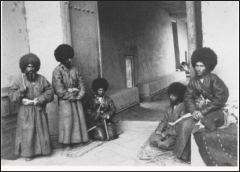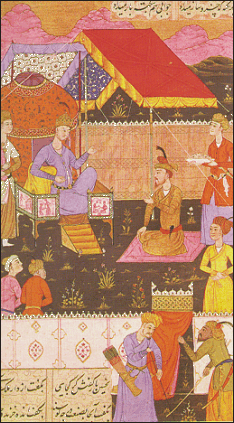 Historical Entrance
Historical EntranceCaptain Nikolai Muraviev had every reason to be nervous on his first audience with Mohammed Rakhim Khan. As he entered the court, two of the Khan's burly bodyguards grabbed him and forced him to his knees. Fearing for his life, Muraviev was relieved to discover that this was the usual way that guests approached his Highness. Having entered on his knees he was allowed to stand up and face the Khan in his royal yurt.
I remained standing before the yurt, in the interior of which the Khan sat, wearing a red robe (made out of the cloth I had brought him) fastened at the breast with a silver button. His head-dress was a turban, and he sat motionless with crossed legs on a Khorassan carpet....The khan has a very taking exterior. He must be six feet high, and they say that no horse can carry him for longer than two hours at a time; his beard is short and red; his voice pleasant, and he speaks distinctly, fluently and with dignity.
Mohammed Rakhim Khan happened to be a particularly fiercesome ruler who had renounced alcohol and smoking, decreeing that any of his subjects caught indulging in such vices would have their mouths slit from ear to ear. This was particularly unfortunate for Muraviev, who had included an ornate 'hookah' (hubble-bubble) pipe amongst his gifts for the Khan. When Mohammed Rakhim asked about the use of this curious object, his quick thinking Vizier hastily explained that it was a bottle for vinegar, for which the Khan had a particular liking. Nikolai Muraviev 'Journey to Khiva through the Turkoman Country' 1819-21 (English Edition 1871)

The curtain was rolled up, and I saw before me Sayid Mohammed Khan, Padishahi Khorezm, or, as he would be styled in ordinary prose, the Khan of Khiva, on a sort of elevation or dais, with his left arm supported upon a round silk velvet pillow, and his right hand holding a short golden sceptre.
Once greetings had been given and received, the Khan began to question the imposter dervish on his plans for pilgrimage.With respect to my means I said, "We dervishes do not trouble ourselves with such trifles. The holy Nefes (breath) which my Pir (chief of my order) had imparted to me for my journey can support me four or five days without any nourishment", and that I had no other wish than God would permit his majesty to live a hundred and twenty years! My words seemed to have given satisfaction, for his Highness was pleased to order that I should be presented with twenty ducats and a stout ass. I declined the ducats with the remark that for a dervish it was a sin to keep money; thanked him, however, warmly for the second part of his most gracious favour, but begged permission to draw attention to the holy commandment prescribed a white ass for pilgrimages, and entreated him therefore to vouchsafe me such a one.
With that, the oily Hungarian managed to exit gracefully, breathing a well-earned sigh of relief.When I found myself again alone within the four walls of my (madrassah) cell I drew a long breath, not a little pleased to find that the Khan, who in appearance was so fearfully desolute, and who presents in every feature of his countenance the real picture of an enervated, imbecile and savage tyrant, had behaved to me in a manner so unexceptional; and that, so long as my time permitted, I could now traverse the Khanate in all directions unmolested. During the whole evening I had floating before me the picture of the Khan, with his deep-set eyes, with his chin thinly covered with hair, his white lips and trembling voice. "What a happy fatality", I repeated to myself. "That gloomy superstition often imposed limits to the might and blood thirstiness of such tyrants!"
By the time the Englishman Captain Frederick Burnaby arrived in 1876, the Khanate had been invaded by General Kauffmann and the KhanÕs power was dwindling rapidly. Mohammed Rakhim Khan II (known more popularly by his pen name, Feruz Khan) nevertheless created an impressive spectacle.Arminius Vambery "Travels in Central Asia" 1864
The treasurer, lifting up a fold of thick cloth, motioned to me to enter. On doing so I found myself face to face with the celebrated Khan, who was reclining against some pillows or cushions, and seated on a handsome Persian rug, warming his feet by a circular hearth filled with burning charcoal. He raised his hand to his forehead as I stood before him, a salute which I returned by touching my cap. He then made a sign for me to sit down by his side. Before I relate our conversation, it may not be uninteresting if I describe the sovereign. He is taller than the average of his subjects, being quite five feet ten in height, and is strongly built. His face is of the broad massive type, he has a low, square forehead, large dark eyes, a short straight nose, with dilated nostrils, and a coal black beard and moustache.... He did not look more than eight and twenty, and had a pleasant genial smile, and a merry twinkle in his eye, very unusual amongst Orientals... I must say I was greatly surprised, after all that has been written in the Russian newspapers about the cruelties and other iniquities perpetrated by this Khivan potentate, to find such a cheery sort of fellow.
Burnaby was able to go on to discuss international politics with the Khan, who was still smarting from the huge taxes demanded by Russia. After a question as to whether the English and Germans were of the same nation, Burnaby decided to show the Khan a world map. However, the Khan disagreed with the positioning of India, until the map was turned in the right direction with India facing towards the Tosh Darvasa! Burnaby whipped out his compass in order to ascertain which direction was north, causing great consternation amongst the courtiers who seemed to think that the compass was some sort of an explosive device.Captain Fredrick Burnaby "A Ride to Khiva" 1876
Although treated with suspicion, foreigners in Khiva during the time of the Khans were shown lavish hospitality by their hosts in true Central Asian style. Even those such as Muraviev, whom the Khan planned on quietly murdering in the middle of the desert, were treated carefully for each Khan was well aware of the danger of assassinating emissaries. However for many local Khivans, Turkomans, Karakalpaks and Bukharans brought before the Khan, their audience would often end with the words, "Away with him!" and they would be dragged towards their impending doom.



